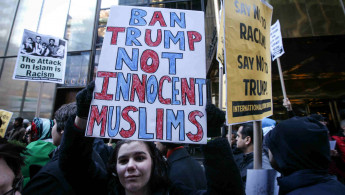Trump presidency heralds 'increase' in anti-Muslim bias and attacks
The Council on American-Islamic Relations (CAIR) said it tracked a 44 percent increase in hate crimes targeting Muslims in 2016 compared with 2015, in addition to a 57 percent rise in anti-Muslim bias incidents.
In total over the course of 2017 CAIR recorded 260 anti-Muslim hate crimes - including physical attacks on individuals and places of worship - in addition to 2,213 incidents of anti-Muslim bias including forms of harassment, and denials of religious accommodation such as prohibiting an employee to wear a hijab, or a prisoner from having a Quran in their jail cell.
Non-violent forms of abuse, such as verbal harassment, were the most common recorded in the survey, accounting for 18 percent of total incidents.
The second largest category, relayed in the CAIR survey titled The Empowerment of Hate, consisted of incidents where complainants were questioned or "inappropriately targeted" by the FBI or other governmental agencies.
"Of the 2016 incidents for which federal government entities were identified as the instigator: the FBI accounted for 62 percent," CAIR said in the survey.
CAIR officials began noticing a spike in anti-Muslim bias incidents beginning in 2014 following the rise of Islamic State group killings in Syria, Iraq, and elsewhere in the Middle East, and attacks inspired by the extremist group in the United States and Europe.
However, according to CAIR officials US President Donald Trump's focus on militant Islamist groups, anti-immigrant rhetoric on the campaign trail, and implementation of a travel ban earlier this year targeting nationals of six Muslim-majority states has also contributed further to an acceleration in anti-Muslim incidents.
In the week following Trump's ascension to the White House CAIR received a total of 111 phone calls reporting anti-Muslim incidents, compared to 30 for a typical week.
CAIR officials have called on the Trump administration to address, and not inflame, "the growing anti-minority sentiment in our nation."
In order to gather data for The Empowerment of Hate CAIR staff members review cases of apparent bias before conducting interviews in order to determine whether a case contains an identifiable element of religious, ethnic, or national origin bias, before the information is then input into a national database, established in 2014.
CAIR was founded in 1994. The organisation had favourable ties with the Obama administration but has also aroused controversy in the past.
Critics have accused it of possessing an Islamist agenda, and ties with the Muslim Brotherhood.
CAIR's statistics on rising anti-Muslim incidents in the US appear to fit with statistics compiled by other organisations.
For example, the Southern Poverty Law Centre, a non-profit legal advocacy organisation specialising in civil rights and public interest litigation, recorded a "dramatic jump in hate violence" across the US following Trump’s presidential election victory.
In total the non-profit organisation identified a total of 1,094 "bias incidents" in the 34 days after Trump took office, the majority anti-immigrant, and anti-Muslim in nature.



